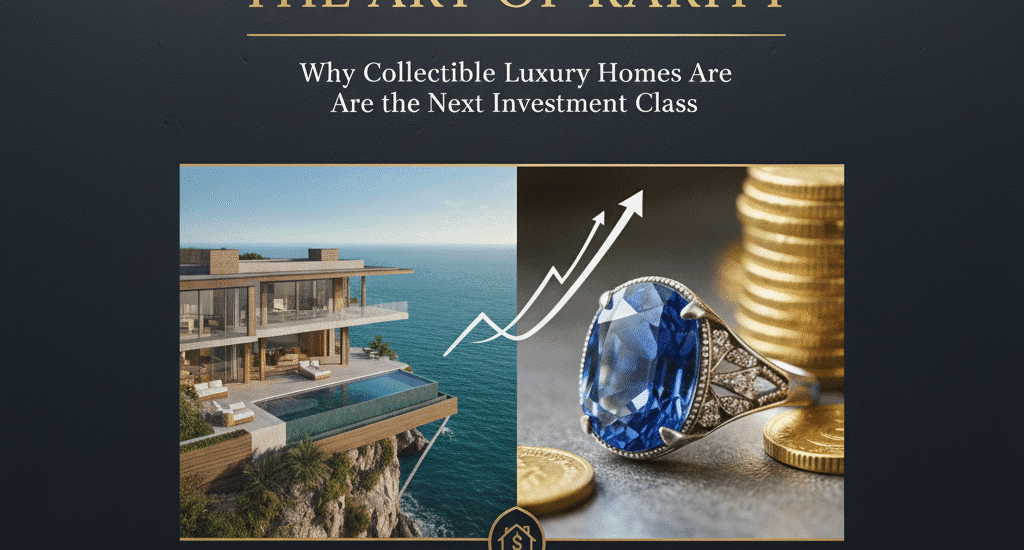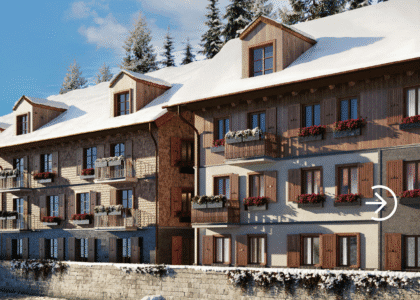Introduction
Luxury real estate has always been more than bricks, mortar, and land. For high-net-worth individuals, the world’s most exclusive residences represent security, prestige, and legacy. But in 2025, a new dimension of property ownership is emerging: collectible luxury homes.
These are not just luxury homes for sale; they are rare masterpieces—heritage estates, architectural icons, one-of-a-kind villas, and limited-edition residences created by globally renowned developers. In today’s upscale property market, these assets are viewed as collectible treasures, much like fine art, vintage automobiles, or rare jewelry.
As international luxury properties continue to attract global buyers, the demand for rarity is reshaping how investors, brokers, and consultants define value. This article explores how collectible luxury homes are becoming a distinct asset class, why they matter, and how the elite real estate network is evolving to meet this new demand.
What Defines a Collectible Luxury Home?
Not every high-end property qualifies as “collectible.” A collectible luxury estate must embody qualities of rarity, exclusivity, and cultural or architectural significance.
1. Provenance and Story
Just as art collectors value a painting’s history, the story behind a property enhances its value. Historic estates, royal residences, or villas once owned by global icons are prime examples of collectible homes.
2. Architectural Uniqueness
Properties designed by “starchitects” like Zaha Hadid, Frank Gehry, or Tadao Ando are considered architectural treasures. Their limited number and distinctive design make them irreplaceable.
3. Scarcity and Location
Oceanfront villas in Monaco, penthouses overlooking Central Park, or castles in the English countryside—all have one thing in common: they cannot be replicated. Location and scarcity transform luxury homes into assets of timeless appeal.
4. Craftsmanship and Detail
From hand-carved marble staircases to bespoke interiors curated by world-renowned designers, craftsmanship is at the heart of collectible properties.
5. Exclusivity and Privacy
Discreet marketing, off-market transactions, and invitation-only viewings elevate a property’s aura, making it part of the elite real estate network.
Why Collectible Luxury Homes Are Gaining Popularity
1. A Hedge Against Market Volatility
Ultra-high-net-worth individuals often view real estate as a safe haven for wealth preservation. Collectible homes, with their unique attributes, hold value better than mass-market luxury real estate listings.
2. Cultural and Emotional Value
Owning a rare property offers prestige and storytelling power. A family legacy home or a one-of-a-kind villa adds emotional richness that money alone cannot replicate.
3. Globalization of Wealth
With billionaires emerging in Asia, the Middle East, and Africa, international luxury properties are in higher demand than ever. Wealthy buyers are expanding portfolios across continents, often competing for rare estates.
4. Rise of Luxury Property Investments as Collectibles
Like limited-edition watches or classic Ferraris, collectible real estate offers both tangible and appreciating value. This crossover between lifestyle and investment is driving a trend that’s here to stay.
Case Studies: Collectible Properties in the Global Luxury Estates Market
The Villa Les Cèdres, France
Once owned by King Leopold II of Belgium, this 187-year-old estate on the French Riviera is valued at hundreds of millions. Its royal provenance makes it one of the world’s most collectible luxury homes.
A Zaha Hadid-Designed Penthouse in Miami
Architectural masterpieces by famous designers are now marketed as rare global luxury estates. A Zaha Hadid penthouse combines architectural legacy with limited availability, appealing to elite investors worldwide.
Underwater Villas in the Maldives
High-tech, futuristic homes like underwater villas have transformed the definition of rarity. With only a handful in existence, these villas attract buyers who want a lifestyle unlike any other.
The Upscale Property Market in 2025
The upscale property market is no longer defined solely by square footage or luxury amenities. Instead, buyers demand experience, identity, and rarity.
- Luxury villas for sale are marketed not only as holiday escapes but also as exclusive retreats offering private beaches, bespoke concierge services, and investment potential.
- Luxury apartments for sale in global cities like London, Dubai, and Hong Kong attract investors looking for prime urban collectibles.
- Exclusive homes worldwide are being positioned as “once-in-a-lifetime opportunities” rather than simple listings.
The Role of Luxury Property Professionals
In this new era, the role of luxury property specialists, consultants, brokers, and advisors has never been more important.
Luxury Property Specialists
Experts who curate listings based on rarity, provenance, and investor goals.
Luxury Property Consultants
Advisors who guide international buyers through complex global transactions, including tax structures and cultural nuances.
Luxury Property Brokers
Trusted intermediaries who discreetly connect sellers and buyers within the elite real estate network.
Luxury Property Experts and Advisors
These professionals are not just dealmakers—they are storytellers who frame properties as investment-grade collectibles.
How Collectible Homes Are Valued
Beyond Comparables
Unlike standard high-end property listings, collectible homes cannot be compared simply on price per square foot. Their value is influenced by history, design, scarcity, and global appeal.
Auction House Influence
Some collectible properties are sold at auction, similar to rare art or jewelry. Auction houses are entering the real estate market, further validating the collectible trend.
Private Sales and Off-Market Transactions
Discretion and exclusivity are key. Many collectible homes never appear in luxury real estate listings but are traded within private networks.
The Future of Luxury Property Investments
Looking ahead, collectible luxury homes are expected to become one of the most sought-after asset classes among billionaires and family offices.
- Luxury property investments will increasingly overlap with art and cultural investments.
- Luxury real estate networks will expand globally, connecting advisors, consultants, and brokers.
- Premium real estate services will include curation, storytelling, and investment analysis, beyond simple listings.
How Primo House Elevates the Conversation
Primo House, with its global luxury estates portfolio and international reach, is uniquely positioned to guide both buyers and sellers in this evolving landscape.
- For Buyers: Access to exclusive homes worldwide, from villas in Europe to high-end property listings in emerging markets.
- For Sellers: Premium real estate services that position their estates as collectible, ensuring global visibility.
- For Developers: A platform to showcase limited-edition residences that appeal to collectors.
- For Professionals: A network of luxury property consultants, brokers, and advisors who understand the nuances of collectible markets.
Conclusion
The definition of luxury real estate is changing. No longer about abundance, it’s about rarity. Collectible luxury homes—defined by provenance, design, scarcity, and story—are becoming the next great investment class.
For buyers, they offer prestige, legacy, and value. For sellers, they present opportunities to achieve record-breaking prices. For advisors, consultants, and brokers, they represent the future of the upscale property market.
As global wealth continues to expand, the demand for exclusive homes worldwide will only grow. Whether you are exploring luxury villas for sale, luxury apartments for sale, or international luxury properties, understanding the art of rarity is essential.
Primo House, with its global network and premium real estate services, stands at the forefront of this revolution—helping clients invest in properties that are not just homes, but masterpieces.





